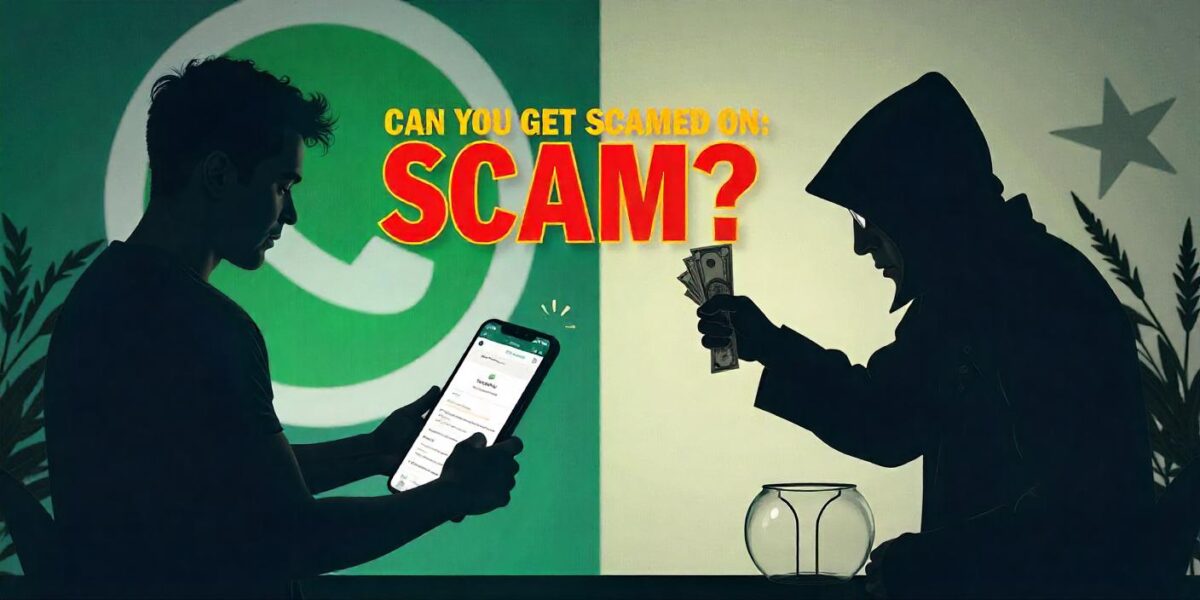Years ago, when WhatsApp was introduced, many lives were sorted, and with time, the updates in the app make it useful for businesses to expand their business too. But at the same time, the increasing fraud, scammers have used it in other ways, and used it to run their evil scams too. So, if you are still wondering, can you get scammed on WhatsApp?
Unfortunately, the answer is Yes.
Let’s get into the details to understand how WhatsApp scams work and the ways to protect yourself.
How Do WhatsApp Scams Work?
With over 2 billion users worldwide, WhatsApp has become a hotspot for scammers. It starts with a simple message, one that looks normal, sounds urgent, or feels familiar, and before you know it, your money, account, or identity is at risk.
Sometimes, it could be code, WhatsApp sends you at the time of installing or activating the WhatsApp account.
At that time, people often think, “Why am I getting a WhatsApp registration code?” and think it to be a glitch, often ignore it.
Let me walk you through a few real stories. You’ll be surprised how easily it can happen to anyone, maybe even you.
1. WhatsApp Video Call Scam
“Pay ₹50,000 or we will take this video viral.”
This is the type of message that victims usually get after picking video call on WhatsApp from a suspicious number.
In short, this is one of those scams that doesn’t just rely on technology but also plays heavily on human psychology and emotions.
In such scams, fraudsters make a sudden video call lasting a few seconds to a few minutes, during which they display disturbing or explicit content. Immediately after the call, they message the victim, claiming to have recorded their facial expressions and threatening to make the video viral.
Fearing damage to their social reputation, the victim often agrees to comply with the scammer’s demands, usually involving a payment ranging from a few thousand rupees to several lakhs.
In many cases, scammers use this tactic as a form of “digital arrest,” creating intense emotional distress and panic among victims.
2. OTP Scams
I Just Sent You an OTP by Mistake
It all starts from one simple message on WhatsApp from someone who looks familiar in the DP.
The message generally looks like: “Hey! Sorry, I accidentally sent an OTP to your number. Please share it quickly. It’s urgent.”
And once you share it, Tadaa, your access from your own WhatsApp is gone. Later, you realized that the friend’s account from whom you received a message was hacked, and now yours is too.
Soon, your contacts began receiving messages asking for money urgently, and by the time you realize that you have been scammed, the scammer has fooled many on your list, too.
3. Prepaid Task Scam
The Job That Can Cost You Big!
How many of you have received a message like: “Easy work, daily payout.”
Most of you, right?
Now, this is another trap that scammers lay on WhatsApp to catch people who are looking for some passive source of income or homemakers who are looking for simple earning ways.
These scammers provide payouts initially to build trust and later manipulate you to enroll for a prepaid task where they ask you to invest some capital to get higher returns.
In the urge to earn huge returns, people generally invest a huge sum until the payouts stop, money gets locked, and difficult to recover.
4. Lottery Scams
Congrats! You’ve Won ₹25 Lakh
Imagine this: You’re sipping tea, and suddenly your phone buzzes with this message: “Congratulations! You’ve won ₹25 lakh in the WhatsApp lucky draw.”
That’s what happened to Mrs. Nair, a retired teacher from Kerala. She was thrilled. A call followed, asking her to pay ₹1,500 as a processing fee. Then ₹5,000 as tax. Then ₹10,000 for account verification.
All in all, she paid ₹1.5 lakh—her savings from her pension. The caller vanished. The lottery? Fake.
5. Crypto Investment Scams
This is one of the traditional scams where people are added to the WhatsApp group just to lure them with the fake P&L screenshots and encourage them to invest.
Once the person gets ready, the scammer makes them download a cloned app or fake investment platform where the victim only comes across the demand for huge processing fees and other security charges on raising withdrawal requests.
And once the scammer’s objective is met, the group gets deleted, and he restarts with another name targeting a new audience, and it keeps going.
Such scams are operated through Tinder as well, giving birth to WhatsApp Scam on Tinder.
Wondering how?
Scammers connect with people on Tinder, and soon ask them to connect on WhatsApp, where they share their investment journey after building an emotional relationship and gaining trust.
Finding it harmless, the victim shows interest in their investment plan. However, scammers, after influencing investors to invest enough amount, block the contact and vanish.
6. Fake Gift Scams
During Diwali or any other festival, you might have received a message like:
“🎉 Amazon is giving free gifts to 500 lucky users! Claim yours now 🎁👇”
Now, once you click the link and enter details with the hope of unlocking the gift, you are asked to first make a payment of small payment of ₹50 or ₹100.
Once done, your hope vanishes in the air as, instead of a gift, you receive a bank message of unauthorised transactions.
By the time you realize that you unknowingly provide access to your banking details, the money from the account has already vanished. Scammers generally succeed in this by running a Business account WhatsApp scam.
In this, they create a fake business account and target a mass audience to run the fraud.
7. KYC Scams
Your Bank KYC Will Expire Today!
“Dear customer, your bank KYC will expire today. Update now, or your account will be frozen. Click here.”
Rohit, a 27-year-old teacher in Pune, panicked. He clicked the link, entered his details, and followed instructions to download a support app for help.
That app allowed the scammer to see everything on his screen—banking apps, passwords, PINs.
Within hours, ₹75,000 was wiped from his account.
What Can You Do If You Are Scammed on WhatsApp?
Fell into the scam and wondering is it possible to get money back after being scammed?
Well, you can but only if you follow right steps and process as mentioned below:
- Report the number on WhatsApp: Tap chat, then on three dots, More & then Report
- Register with us: There are other ways to file a complaint and get a recovery. Get our assistance now.
- Inform your bank immediately if financial details are compromised
- Enable 2-step verification on WhatsApp right away
How to Protect Yourself from WhatsApp Scams
Prevention is better than cure, and hence it is essential to stay alert and active while opening or clicking any message from an unknown source on WhatsApp.
Here are the ways to protect yourself from falling into the trap:
- Don’t share OTPs or passwords: Even if someone claims to be a friend or family member, never share your OTP or login details.
- Don’t click on unknown links: Avoid links that offer gifts, cashback, or rewards. These often lead to fake websites that steal your information.
- Always verify before sending money: If someone messages you asking for urgent money, call them to confirm. Scammers often pretend to be someone you know.
- Avoid downloading apps from unknown sources: Don’t install apps that someone sends you on WhatsApp, especially if they ask for screen-sharing access.
- Report and block suspicious messages: If you get a scam message, report the number on WhatsApp and block the contact to prevent future messages.
Above all, learn tips and tricks on how to identify a scammer on WhatsApp.
Final Words
So, if you are still wondering, ‘Can you get scammed on WhatsApp?’ then it is time to get aware.
Scammers play on trust, urgency, and emotion. But if you slow down, think clearly, and double-check before acting, you can protect yourself and those around you.
The next time you get a message asking for money, sharing a “lucky draw,” or urging quick action, pause. It might just save you a lot of trouble.







